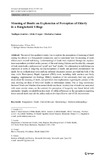| dc.contributor.author | Joarder, Taufique | |
| dc.contributor.author | Cooper, Alicia | |
| dc.contributor.author | Zaman, Shahaduz | |
| dc.date.accessioned | 2016-04-27T11:28:22Z | |
| dc.date.available | 2016-04-27T11:28:22Z | |
| dc.date.copyright | 2014 | |
| dc.date.issued | 2014-06-25 | |
| dc.identifier.citation | Joarder, T., Cooper, A., & Zaman, S. (2014). Meaning of Death: An Exploration of Perception of Elderly in a Bangladeshi Village. Journal of Cross-Cultural Gerontology, 29(3), 299–314. http://doi.org/10.1007/s10823-014-9237-6 | en_US |
| dc.identifier.issn | 1573-0719 | |
| dc.identifier.issn | 01693816 | |
| dc.identifier.uri | http://hdl.handle.net/10361/5192 | |
| dc.description | Includes bibliographical references (page 313). | en_US |
| dc.description | This article was published in Journal of Cross-Cultural Gerontology [© 2014 Springer Science+Business Media New York] and the definite version is available at: https://www.ncbi.nlm.nih.gov/pubmed/24962877 | |
| dc.description.abstract | The aim of this qualitative study was to explore the perceptions of meaning of death
among the elderly in a Bangladeshi community, and to understand how the meaning of death
affects one’s overall well-being. Understandings of death were explored through the explanations
respondents provided on the journey of the soul during lifetime and the afterlife, concepts
of body-soul duality, and perceived “good” and “bad” deaths. The relationship to well-being was
expressed in terms of longevity, anxiety/acceptance of death, and preferred circumstances for
death. Seven in-depth interviews and one informal discussion session provided the bulk of the
data, while Participatory Rapid Appraisal (PRA) tools, including daily routines and body
mapping, supplemented our findings. Elderly members of the community had very specific
ideas about the meaning of death, and provided clear explanations regarding the journey of the
soul, drawing on ideas of body-soul duality to substantiate claims. Due to long coexistence
fusion of Hindu and Muslim ideas around death was found. Anxiety/fear of death was associated
with some secular issues, on the contrary the perception of longevity was found linked with
spirituality. Insights revealed from this study of subtle differences in the perceptions regarding
issues around death may aid the policy makers develop effective end-of-life interventions. | en_US |
| dc.description.statementofresponsibility | Taufique Joarder | |
| dc.description.statementofresponsibility | Alicia Cooper | |
| dc.description.statementofresponsibility | Shahaduz Zaman | |
| dc.format.extent | 16 pages | |
| dc.language.iso | en | en_US |
| dc.relation.uri | https://www.ncbi.nlm.nih.gov/pubmed/24962877 | |
| dc.rights | BRAC University Journals are protected by copyright. They may be viewed from this source for any purpose, but reproduction or distribution in any format is prohibited without written permission. | |
| dc.subject | Bangladesh | en_US |
| dc.subject | Death | en_US |
| dc.subject | End-of-life care | en_US |
| dc.subject | Gerontology | en_US |
| dc.subject | Medical anthropology | en_US |
| dc.title | Meaning of death: an exploration of perception of elderly in a Bangladeshi Village | en_US |
| dc.type | Article | en_US |
| dc.description.version | Published | |
| dc.description.version | Published | |
| dc.contributor.department | James P Grant School of Public Health, BRAC University | |
| dcterms.publisher | © 2014 Springer Science+Business Media New York | |
| dc.identifier.doi | http://dx.doi.org/10.1007/s10823-014-9237-6 | |

